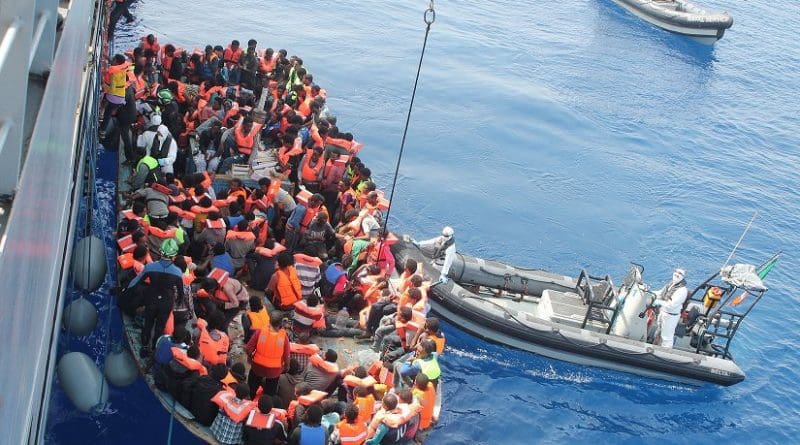When Humanity Died With Aylan Kurdi – Analysis
By Observer Research Foundation
By Vikram Sood*
What is happening in Europe is that people are fleeing Syria, Iraq, Afghanistan and Libya and seeking shelter as refugees. It is misleading and incorrect to describe them as migrants because this seems to be a convenient narrative for the future to send them back. The dictionary definition of migrants describes them as those who voluntarily leave in search for better prospects. Refugees are those that flee depredations of war, ideological and religious persecution or natural disasters.
The unfolding human tragedy about Syria has been the result of a number of factors. Bashar Assad’s refusal to step down in face of a sponsored uprising was one of them. Despotic Sunni regimes and western powers anxious to reduce Iran’s power began an intervention that went horribly wrong. Further, the unwillingness of Peninsular and Gulf Arabs to give shelter to the fleeing refugees, calls into question their Islamic credentials and motives.
Currently Americans, British and French are back in form as they bomb the Syrians, saying this is to save them from themselves. There are no precision IS-specific bombs that will kill without collateral damage. All this and Assad’s grip allowed Islamic radicals to take control with brutal and alarming speed. Consequently, the image of that little boy Aylan Kurdi has become evocative of this unfolding massive tragedy. This reminds one of the photos of nine-year old Kim Phuc fleeing down the road with her body aflame from napalm air attacks in the tragic Vietnam war. Syrians, Tibetans, Afghans and Bengalis or even Rohingyas were lucky because they had a place to go to.
There have been several similar incidents in history with innocents fleeing from war and death that the rest of the world imposed on them. Our own region has witnessed fleeing refugees several times. In 1947, India and Pakistan began an exchange of population which soon became violent and bloody. We absorbed all of them, but in Pakistan, seventy years on, they still call them Mohajirs. Tibetans took refuge in India when the Chinese seized their land and they were not migrants. India again had refugees prior to the 1971 war with Pakistan as the Bengalis fled western Pakistani atrocities. Years later, Pakistan had to deal with millions of refugees as helpless Afghans fled from the consequences of the Afghan jihad and later the depredations of the Taliban.
One is reminded of a moving story, Address Unknown, written by Kressman (Katherine) Taylor and first published in 1938. It is a tale about the horrors and tragedy of Nazi Germany and is narrated through letters between an American Jew and his German friend. The book is about how living people are swept away by warped ideology. The story depicts an age of racial, ethnic and nationalistic intolerance — a history that we see repeating itself today.
The situation in Syria is not likely to ease soon. There are reports that Russians have announced increased assistance to the Assad government. This only means continued bloodshed. Refugees and civilians here or elsewhere, will soon become merely a statistic in this tense stand-off between the Western powers and Russia. Besides, in modern warfare, conventional or terror campaigns, more than 50 per cent of casualties today are civilians, as against the earlier figure of about 10-15 per cent at the beginning of the 20th century.
It is feared that the seamier, darker side of free market capitalism — of market forces of demand and supply and where profit is king — will take over. Human venality knows no bounds. Amidst all these gestures by the German government and somewhat less so by others, a nightmare stalks the security agencies. A 1.5-trillion dollar criminal economy that mostly laundered its US dollars in America existed until September 11, 2001. The US clamped down with the Patriot Act and money laundering activity shifted substantially to Europe, where the restrictions to money transfers within EU were fewer.
Unsettled times are good times for a criminal economy and terrorists. Islamist radicals will undoubtedly see this exodus as an opportunity to get into Europe and spread their ideology. Only recently Ayman Al- Zawahiri exhorted his Al Qaeda followers to continue their campaign against the Crusaders. The fear now would be about increased activities of human traffickers and gunrunners. One can see the return of border controls and increased surveillance as security agencies try to sort out the real refugee from the fake.
Global power brokers have the ability to start wars, accompanied by an unfortunate inability to stop them. Human tragedy is destined to continue.
*The writer is an Advisor to Observer Research Foundation and a former chief of Research and Analysis Wing
Courtesy:www.mid-day.com

